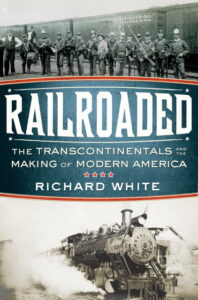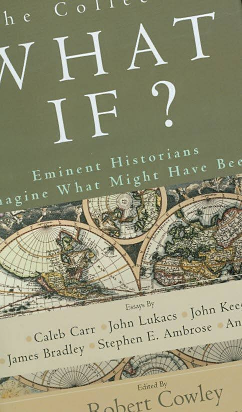Here’s a series of blazing hot takes: we study history because it happened. Events that occur inform our understanding of the events that follow them, and so historical understanding forms the bedrock of our understanding of the present day. This isn’t necessarily to say that we as a society strictly need to understand the nuances of the dynasties of imperial China or the battles fought by the Roman Legions in order to grasp the technicalities of politics and society today—but I’m sure you all get the idea. History is important because it happened, and our world is shaped by the consequences of things that have happened.
Things that didn’t happen, though, often hold just as much allure to historians—professional and amateur alike—as things that did. Counterfactual history and alternative history are two fields of historical speculation that in recent years have enjoyed a rising presence in media. The difference between the two is persnickety, and the two are often considered one and the same: counterfactual history evaluates the consequences of negating or changing a particular event or outcome, while alternative history imagines the long-term historical scenario which would play out from such a change. Counterfactual history, in this sense, is the more academically-grounded of the two, as it works to understand the consequences and significance of particular outcomes on historical events. Alternative history, meanwhile, is perhaps better considered as a form of speculative historical fiction, imagining a world wherein the historical reality is different from our own.
In my personal experience, the vast majority of historians and students of history have dabbled in counterfactual and alternative history, if only as a curiosity. As I have written here in the past, a collection of counterfactual history essays captured my imagination as a high school student and helped push me toward studying history at all. To this day, imagining alternative history scenarios remains one of my preferred mental exercises to distract me as I fall asleep. In general, though, counterfactual history is typically considered little more than an entertaining trifle among serious historians. Even as an aficionado myself, it’s easy to understand why: for an evidence-based discipline that works with things as they are and have been, understanding things that are not or only could have been is unmooring.
Imagining counterfactual scenarios tends to raise the risk of historical malpractice as well. On the one hand, many scenarios—particularly those which capture the public imagination—tend to lean into tired tropes of great man theory: what if Hitler was assassinated, what if Abraham Lincoln wasn’t assassinated, and so forth. In these scenarios, the assumption is often that the world would be invariably different if only for the survival, death, or differing action of one (or a few) powerful men. Variations of this are especially common in military history as well: If I only had a dollar for each time I’ve heard “What if the South won at Gettysburg?”
On the other hand, overcorrection can be just as problematic. A counterfactual scenario which produces too-similar to near-identical results as the original timeline runs into issues of historical determinism: suggesting that broad forces, no matter the changes at play, would render the same result because certain events were inevitable. If I, too, only had a dollar for each time I’ve heard “Was the Civil War inevitable?” Deterministic counterfactual scenarios may be avoided by, say, increasing the scope of the counterfactual difference or establishing further temporal difference between the difference and would-be deterministic outcome—but at that point, a counterfactual scenario runs the risk of becoming an alternative one. The line between counterfactual analysis and alternative fiction is incredibly thin.
On these issues and more, Richard J. Evans, a historian of German history, argues that counterfactual history distracts from an understanding of why things happened as they did by focusing on nebulous and unknowable alternative possibilities—essentially abdicating historical responsibility. I’ve recently read a compelling argument from historian of the American West Richard White, though, that has me thinking. In his book Railroaded: The Transcontinentals and the Making of Modern America, White attacks the historical myth that the construction of transcontinental railroads in the mid- and late-nineteenth century were hallmarks of modernity in an industrializing United States. Rather, he presents compelling evidence for the railroads and companies that built them being dramatically inefficient and over-constructed and the industrialists who built them being neither ingenious captains of industry nor conniving robber barons, but rather bumbling, grasping, and corrupt everymen who had no understanding of the economic forces they were unleashing. In his conclusion, White argues that this reality did not necessarily have to be, and has this to say on counterfactual history:

“We need to think about what did not happen in order to think historically. Considering only what happened is ahistorical, because the past once contained larger possibilities, and part of the historian’s job is to make those possibilities visible; otherwise, all that is left for historians to do is to explain the inevitability of the present. The inevitability of the present violates the contingency of the past, which involves alternative choices and outcomes that could have produced alternative presents. To deny the contingency of the past deprives us of alternative futures, for the present is the future’s past. They are fictions, but necessary fictions. It is only by conceiving of alternative worlds that people in the past themselves imagined that we can begin to think historically, to escape the inevitability of the present, and get another perspective on issues that concern us still.”
Evans may suggest that this conclusion is still unsatisfactory, but White’s focus on a broad development in economic history does diverge from Evan’s greatest criticism on great man-esque counterfactuals. I personally find White’s point to be well made: while counterfactual scenarios are of variable value in understanding historical outcomes, they may be of greater use in understanding how historical people thought. Oftentimes, even in non-counterfactual history, determinism rears its head, as all historical narratives are written with a knowledge of what comes next. While this helps readers understand how events led to others and created some of history’s most dramatic occurrences, it obscures the perspective of the era itself where the future was uncertain and undetermined.
Understanding the past’s future not as an inevitability but something that was once uncertain can help historians better comprehend why historical actors behaved as they did. Personally, I don’t think this application abdicates historians from their responsibility of also understanding events as they occurred: rather, it complicates the question, asking both “Why did this occur?” and “Why did the outcomes historical people expected not occur?” Just as studying what has occurred helps us understand the present, understanding counterfactual expectations of the future may help us grapple with our own uncertainty and complicate our understanding of just how it was we actually got here.
